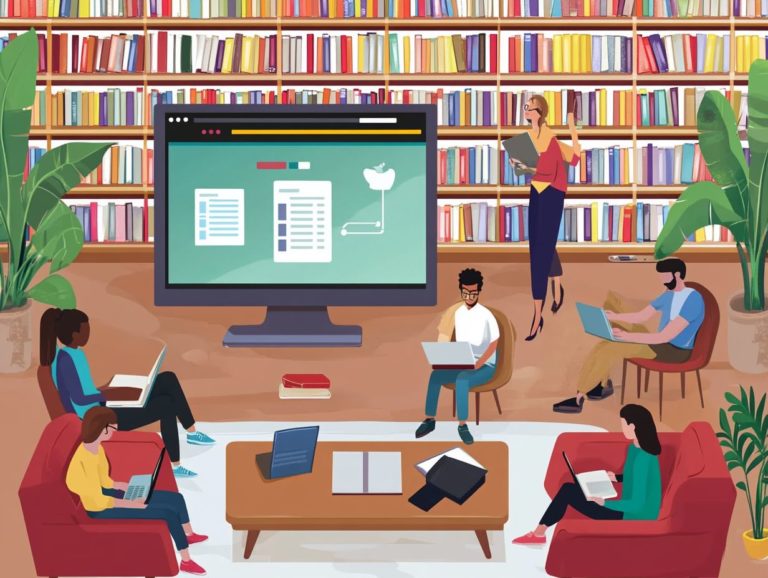The Role of Mentorship in E-Learning
In today s digital landscape, mentorship stands out as a powerful catalyst for growth in e-learning environments. This article delves into the multifaceted role of mentorship, emphasizing its myriad benefits for both academic and personal development.
You will gain insights into the distinctions between formal and informal mentorship, as well as the key traits that define effective mentors. We will guide you through the process of discovering and nurturing these invaluable relationships.
Practical tips for fostering a successful mentor-mentee dynamic will be shared, along with an exploration of the broader impact of mentorship on e-learning success.
Discover how mentorship can transform your learning journey today!
Contents
- Key Takeaways:
- Benefits of Mentorship in E-Learning
- Types of Mentorship in E-Learning
- Formal vs. Informal Mentorship
- Qualities of a Good Mentor
- How to Find a Mentor in E-Learning
- Tips for a Successful Mentor-Mentee Relationship
- Impact of Mentorship on E-Learning Success
- Frequently Asked Questions
- Why is mentorship vital for e-learning success?
- How can mentorship improve the overall e-learning experience?
- What qualities should a mentor possess in the context of e-learning?
- Is mentorship only beneficial for students in e-learning?
- How can one find a suitable mentor for e-learning?
- What are some best practices for a successful mentor-mentee relationship in e-learning?
Key Takeaways:

- Mentorship in e-learning promotes academic and personal growth for mentees.
- Informal mentorship in e-learning can be just as impactful as formal mentorship.
- A successful mentor-mentee relationship in e-learning requires effective communication and goal setting.
Defining Mentorship and E-Learning
Mentorship and e-learning are important methods shaping the modern educational landscape. Each enhances learner engagement and knowledge retention in its own distinct way.
Mentorship is a supportive relationship where an experienced person helps someone who is learning, paving the way for both personal and professional growth.
E-learning, in contrast, utilizes technology to present educational content flexibly. This allows you to interact with materials at your own pace. When combined, they forge an effective learning environment that champions student autonomy and elevates learning outcomes.
By integrating mentorship into e-learning platforms like Blackboard, Zoom, and MS Teams, educational institutions can significantly enhance your learning experience. Mentorship not only encourages you to seek guidance and feedback but also cultivates a sense of community, which is vital in virtual settings.
These platforms enable real-time interactions and collaborative activities, allowing mentors to offer personalized support tailored to your unique learning needs. This approach encourages deeper engagement, resulting in improved knowledge retention as you actively apply your insights and experiences through ongoing dialogues with your mentors.
Benefits of Mentorship in E-Learning
Integrating mentorship into e-learning presents a wealth of benefits that elevate your learning experience while significantly boosting knowledge retention and engagement.
These advantages extend to personalized learning, where mentors offer tailored support to help you navigate academic challenges. This approach fosters a rich environment conducive to both professional development and personal growth.
Academic and Personal Growth
Mentorship plays a crucial role in your academic and personal growth, offering the essential guidance and support you need throughout your educational journey. Engaging in structured mentoring relationships allows you to hone critical communication and interpersonal skills, enhancing your overall learning experience and fostering greater autonomy in your studies.
Your mentors don t just dispense knowledge; they act as sounding boards for your ideas, helping you shape your thoughts and devise strategies for success. For example, mentorship programs at universities often connect you with professionals in your field, granting you access to real-world perspectives that enrich your classroom experience.
Initiatives like peer mentoring enable you to assist your fellow students, cultivating a strong sense of community and collaboration. These dynamics can significantly elevate your confidence, empowering you to face academic challenges with resilience while also nurturing personal qualities such as empathy and leadership.
Types of Mentorship in E-Learning
In the world of e-learning, you ll find that mentorship comes in various forms, each tailored to serve specific purposes and deliver distinct advantages.
Formal mentorship usually involves structured programs with well-defined roles and objectives, ensuring a clear path to growth. On the other hand, informal mentorship often develops organically, emerging through peer relationships that encourage collaborative learning and the sharing of knowledge.
Formal vs. Informal Mentorship

The contrast between formal and informal mentorship reveals important distinctions in structure, objectives, and outcomes within e-learning environments.
Formal mentorship typically unfolds within established frameworks, guiding you through structured programs designed to meet specific training objectives. In contrast, informal mentorship fosters spontaneous learning opportunities through peer mentoring and casual interactions.
These two approaches present unique advantages and challenges that can significantly shape your learning experience.
For instance, formal mentorship offers consistency and a clear roadmap for growth, making it easier for you to track your progress and achieve defined goals. However, it can sometimes feel rigid or overly prescriptive.
Informal mentorship encourages a more organic learning process, allowing you to engage with diverse perspectives and experiences.
Effective peer mentoring practices, such as collaborative projects or casual study groups, demonstrate how informal dynamics can lead to richer exchanges of ideas and support, ultimately enhancing your overall learning experience.
Qualities of a Good Mentor
A great mentor possesses many qualities that elevate the mentoring relationship, particularly vital for thriving in e-learning environments.
Key attributes, such as strong people skills, effective communication, and the capability to build trust, are essential in ensuring that the mentor is accessible and in cultivating an inviting learning atmosphere.
Key Traits and Skills
The key traits and skills of an effective mentor encompass empathy, patience, and strong communication.
These qualities are essential for nurturing a positive and productive mentoring relationship.
Your ability to build rapport and trust can significantly enhance the effectiveness of your mentorship, encouraging learner engagement and facilitating knowledge sharing.
An empathetic mentor understands the challenges you face, providing tailored support that transforms your learning experience into something truly meaningful.
Patience allows you to navigate misunderstandings or setbacks, creating a safe space where you feel comfortable asking questions and voicing concerns.
Strong communication skills help you share knowledge clearly and listen actively, fostering open dialogue that leads to deeper insights.
When you prioritize relationship building, you establish a foundation of respect and collaboration, ultimately enhancing learning outcomes and paving the way for your long-term professional growth.
How to Find a Mentor in E-Learning
Finding a mentor in e-learning can change everything about your educational journey!
To make this process seamless, begin by seeking out potential mentors within your educational institution or online learning communities.
Consider their expertise, accessibility, and how well they align with your academic aspirations.
This thoughtful approach will set the stage for a rewarding mentorship that enhances your learning.
Strategies for Identifying and Approaching Mentors
Effective strategies for identifying and approaching mentors in e-learning require a thoughtful, step-by-step process that focuses on clarity and relationship building.
Start by researching potential mentors within your educational programs or industry, evaluating their expertise in relation to your specific learning objectives.
After narrowing down suitable candidates, consider the most effective ways to initiate contact.
A well-crafted email or a message on professional networking platforms can set the tone.
Be sure to articulate your interests clearly and explain how their experience aligns with your goals.
As you work to establish a rapport, look for common ground, shared interests, or mutual connections to create a comfortable dialogue.
Active listening and expressing genuine curiosity about their journey will enrich the conversation significantly.
Lastly, developing a structured mentorship program that aligns with your personal milestones can enhance the exchange, ensuring that both you and your mentor feel engaged and invested in the relationship.
Start your journey today and find a mentor who can guide you toward success!
Tips for a Successful Mentor-Mentee Relationship

Building a successful mentor-mentee relationship relies on your ability to communicate effectively and set clear goals. These elements are crucial for cultivating trust and mutual respect.
By establishing regular check-ins and maintaining open dialogue, you ensure that both you and your mentor are aligned on expectations and progress. This ultimately enriches the mentorship experience for both of you.
Communication and Goal Setting
Communication and goal setting are vital components of your mentor-mentee relationship, forming the foundation for effective mentoring and successful outcomes. Clear dialogue about expectations and objectives enables both you and your mentor to navigate your educational journey in harmony.
Open lines of communication cultivate trust and invite honest feedback essential ingredients for your growth. By collaboratively establishing specific, measurable, and achievable goals, your mentor can guide you more effectively, ensuring both of you remain aligned and focused on the desired learning outcomes.
This strategic approach structures your mentorship experience and empowers you, instilling a sense of responsibility for your own development.
When mentors actively listen and tailor their strategies to meet your unique needs, the entire process becomes far more rewarding, ultimately fostering enhanced personal and professional growth for you.
Impact of Mentorship on E-Learning Success
The impact of mentorship on your e-learning success is truly profound, as numerous research studies and case analyses underscore its important role in corporate training to boost learner engagement and knowledge retention.
Whether you opt for formal or informal mentorship strategies, they play a significant part in achieving your educational goals, guiding you seamlessly through both your academic and professional journeys.
Research and Case Studies
Research and case studies offer compelling evidence of the significant impact mentorship has on your e-learning success, particularly regarding knowledge retention and learner engagement. These studies often show how structured mentorship programs can lead to improved academic performance and heightened student satisfaction.
For instance, a recent study from the University of California delved into various mentorship frameworks, emphasizing one-on-one and group mentoring sessions within online classrooms. The researchers employed a mixed-methods approach, which means using both surveys and interviews to gather data, to assess the effectiveness of peer mentorship on both retention rates and student motivation.
The findings revealed that students who engage in mentored e-learning environments not only experience higher completion rates but also report feeling more connected to the course content and their peers. This shows how crucial it is for schools to focus on developing robust mentorship strategies, ultimately enhancing your e-learning experience and guiding best practices in curriculum design and student support systems.
Frequently Asked Questions
Why is mentorship vital for e-learning success?

Mentorship plays a crucial role in e-learning as it provides guidance, support, and motivation to learners, helping them to achieve their academic and personal goals. Understanding the role of mentorship in leadership development can further enhance this experience.
How can mentorship improve the overall e-learning experience?
Mentorship can enhance the e-learning experience by offering personalized attention and feedback, promoting critical thinking and problem-solving skills, and highlighting the role of mentorship in performance management while fostering a positive learning environment.
What qualities should a mentor possess in the context of e-learning?
A mentor in e-learning should possess excellent communication and interpersonal skills, be knowledgeable and experienced in the subject matter, and be patient and empathetic towards their mentees.
Is mentorship only beneficial for students in e-learning?
No, mentorship benefits teachers and instructors in e-learning too. It helps them improve teaching skills, learn new technologies, and stay updated on industry trends.
How can one find a suitable mentor for e-learning?
To find a suitable mentor in e-learning, network with professionals. Join online communities and ask for recommendations from teachers or peers.
What are some best practices for a successful mentor-mentee relationship in e-learning?
To ensure a successful mentor-mentee relationship in e-learning, set clear expectations. Regular communication and constructive feedback are essential, along with being open to mutual learning.






